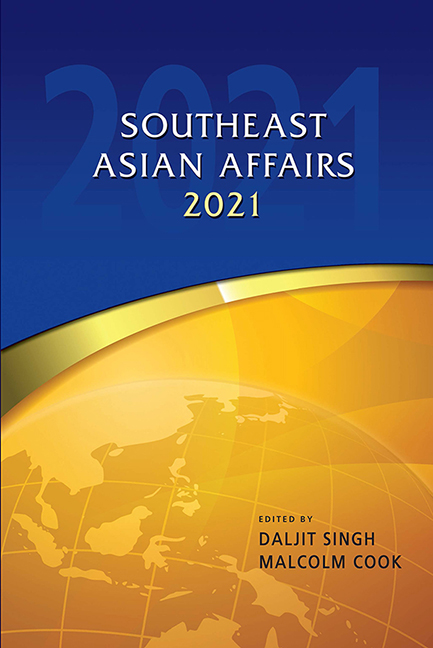Thailand in 2020: A Turbulent Year
Published online by Cambridge University Press: 09 October 2021
Summary
Despite the odds, the elected coalition government headed by former army chief turned prime minister Prayut Chan-ocha managed to endure the year, including surviving a censure debate and no confidence motions against six senior ministers (including Prayut) in February 2020. In December 2020 the judiciary also cleared a legal challenge filed against Prayut for an alleged conflict of interest, thus dashing the hopes of his opponents for his removal as prime minister.
While the March 2019 elections formally dissolved the junta that had ruled since the 2014 coup, it was held under conditions that ensured that Prayut and the military would be able to retain power for the foreseeable future. The junta, for instance, introduced the 2017 constitution, which allowed the ex-general to be named as the prime ministerial candidate for the military-affiliated Palang Pracharat party despite Prayut not being a member of any of the political parties contesting in the 2019 election. The 2017 charter also created the Senate, an upper legislative chamber of 250 members, all of whom are appointed by the junta. Significantly, the senators are involved in the selection of the prime minister, which meant that Prayut only needed to secure 126 votes in the 500-member lower house to emerge as the prime minister. In fact, Palang Pracharat ended up with only 116 out of 500 seats in the House of Representatives, second to the Shinawatra-allied Pheu Thai party, which secured 136 seats. This made it necessary for Palang Pracharat to cobble together a governing coalition of 19 political parties, including a number of micro-parties, or political parties with a single parliamentary seat each. The final post-election tally provided the Prayut government with a slim initial majority of 254 votes in the lower house.
This razor-thin margin caused significant trouble for Prayut. The weakness and fragility of his coalition government were exposed time and again, with some members of Parliament (MPs) in the coalition reserving their right to vote against the government, or even in favour of the opposition. Given the rifts in the coalition, the government has had to employ several tactical manoeuvres to get its way in Parliament.
- Type
- Chapter
- Information
- Southeast Asian Affairs 2021 , pp. 335 - 355Publisher: ISEAS–Yusof Ishak InstitutePrint publication year: 2021



